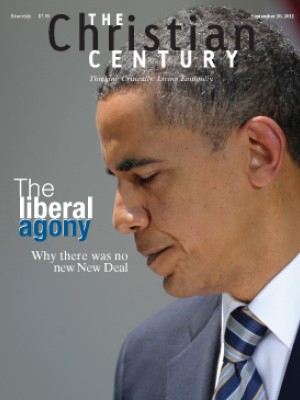Presidential limits

These are frustrating times for Americans who believe that their government should actively promote employment, equality and social welfare. Elected officials are disinclined to kick-start the fragile economy. The Obama administration remains cozy with the financial industry. And President Obama's signature accomplishment—health-care reform—is under continual threat in the courts and in the states.
Some blame a lack of conviction or leadership on Obama's part. Others point to congressional Republicans' intransigence and irresponsibility. The president's approval rating is at an all-time low; so is House Speaker John Boehner's.
In this issue, Robert Westbrook examines Obama's failure to follow in Franklin D. Roosevelt's footsteps by seizing the opportunity for large-scale reform amid crisis. Among other things, Westbrook explores Obama's limited progressive vision, his "pragmatic minimalism" and the fierce Republican opposition. These aren't mutually exclusive explanations for the problem, and they share a common theme: it's a mistake to place too much hope for justice and equality in President Obama.
Read our latest issue or browse back issues.
Americans romanticize the presidency and overestimate its significance. We tend to believe that all a president has to do to transcend Washington dysfunction is deliver a stirring speech. This speech should be based on heartfelt conviction, not poll data—hence the clichéd Hollywood scene in which a politician changes everything by going off script at the podium.
As Westbrook points out, it's perplexing that Obama hasn't made better use of his considerable rhetorical skills, as Roosevelt did. But while this would be a positive step, it would likely be a small one. When FDR used the specter of "fear itself" to order up the New Deal, he brilliantly crystallized his mandate for reform. But this mandate was already present; the speech didn't create it. The reality of governing is that many elements are outside the president's control, via rhetoric or anything else.
This is particularly true in the domestic sphere. Congress controls the legislative agenda and holds the power of the purse. States and localities manage a lot of the programs aimed at assisting low-income people. Supporters of progressive reform might focus more attention on these elected officials and less on the failings, real and imagined, of the White House.
Citizens would also do well to pour energy into grassroots activism. Westbrook points out that FDR would not have taken the egalitarian approach he did without pressure from organized social movements—pressure that's lacking today. Roosevelt reportedly pushed labor organizers to take to the streets and create the political space for leaders in Washington to act on their behalf. Stories are told of President Lyndon Johnson taking a similar stance with Martin Luther King Jr.
A memorial to King just opened on the National Mall. It's appropriate that it opened during the tenure of our first black president. But the statue of King, sitting near memorials to Washington, Jefferson, Lincoln and FDR, offers a pointed reminder for these times: presidents don't create social change; popular movements do, and presidents respond.






